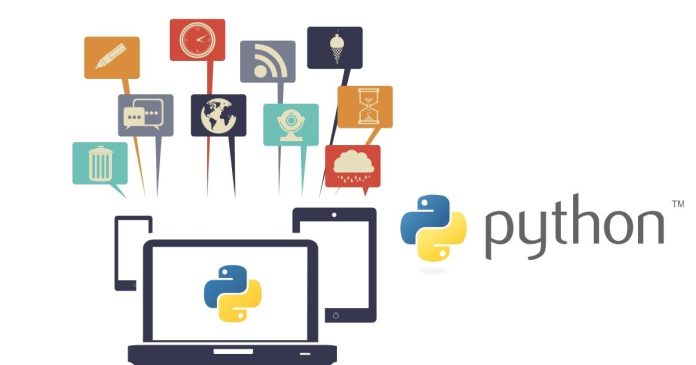Python is a versatile and widely-used programming language that has applications in many fields. Some of its prominent applications include:
1. Web Development
- Python is used to build dynamic websites and web applications.
- Frameworks like Django, Flask, and Pyramid make it easier to develop robust web applications quickly.
2. Data Science and Analytics
- Python is a leading language for data analysis and visualization.
- Libraries like Pandas, NumPy, and Matplotlib help process and visualize data.
- Python is commonly used for data cleaning, statistical analysis, and reporting.
3. Machine Learning and Artificial Intelligence
- Python is one of the most popular languages for machine learning (ML) and AI.
- Libraries such as TensorFlow, Keras, PyTorch, and Scikit-learn enable the development of predictive models and neural networks.
- It’s used in natural language processing (NLP), computer vision, and reinforcement learning.
4. Automation and Scripting
- Python is widely used for automating repetitive tasks, such as data entry, file handling, and web scraping.
- Tools like Selenium and BeautifulSoup are commonly used for web scraping.
5. Game Development
- Python is used to develop games, particularly for prototypes or simple 2D games.
- Pygame is a popular library for game development.
6. Desktop GUI Applications
- Python can be used to create graphical user interface (GUI) applications.
- Libraries like Tkinter, PyQt, and Kivy help in creating cross-platform desktop applications.
7. Cybersecurity
- Python is extensively used in security applications for tasks such as penetration testing and vulnerability scanning.
- Tools like Scapy, Cryptography, and PyCrypto are widely used in cybersecurity.
8. Networking
- Python is often used to write networking software, including server-client applications, socket programming, and network automation.
- Libraries like Twisted, socket, and Paramiko are useful for networking tasks.
9. Scientific Computing
- Python is widely used in scientific research for numerical simulations, statistical analysis, and computational physics.
- Libraries like SciPy, SymPy, and Astropy make Python suitable for various scientific domains.
10. Finance and FinTech
- Python is used in the finance sector for algorithmic trading, risk management, financial modeling, and quantitative analysis.
- Libraries such as QuantLib and pandas are commonly used in financial data analysis.
11. Cloud Computing
- Python is a popular choice for cloud services and automation, especially with platforms like AWS, Google Cloud, and Microsoft Azure.
- Python’s simplicity and flexibility make it ideal for deploying cloud-based applications.
12. Internet of Things (IoT)
- Python is commonly used in the development of IoT systems, as it is lightweight and easy to integrate with hardware.
- Raspberry Pi, a popular microcomputer, uses Python for various IoT projects.
13. Education and Teaching
- Python is often used in schools and universities to teach programming because of its simple syntax and ease of learning.
- Many coding bootcamps and online platforms also focus on Python due to its beginner-friendly nature.
14. DevOps and System Administration
- Python is widely used for writing scripts and automation tools for system administration, configuration management, and DevOps tasks.
- Python-based tools like Ansible and SaltStack are frequently used in infrastructure management.
15. Blockchain and Cryptocurrencies
- Python is used to build blockchain applications and work with cryptocurrencies.
- It can be used for creating smart contracts, token development, and building decentralized apps (dApps).
Conclusion:
Python’s simplicity, large ecosystem of libraries, and wide range of applications make it a go-to language for developers across many industries. Its flexibility allows it to be used for web development, machine learning, data science, automation, and much more.


